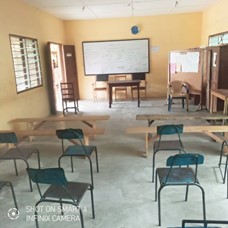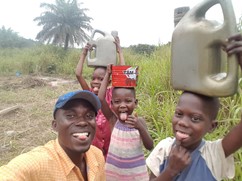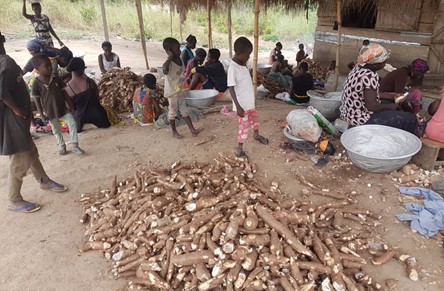Ghana: Building foundations
Building foundations
Ghana is considered one of Africa’s success stories, with a stable government and strong economic growth. It is rich in human and natural resources – notably gold and oil. There are however still some “left behind” areas that lack the infrastructure which would allow residents to enjoy the advantages of town- and city-dwellers.
Our partner works in one such area where people are still relying on subsistence farming and small-scale trading for their livings: they cannot even grow cash crops such as coffee or cocoa because of the lack of roads which would allow crops to be taken to market. This group has identified three main areas which would provide local communities the foundations for bettering their lives: fresh water supply, health care and education. With clean water and improved health, not only will the children have the opportunity for more education, but the adults too will have more time and strength to help with community projects like road building and run side businesses to increase family income.
As well as school and vocational training tools and equipment, this shipment will include medical equipment and baby supplies for local clinics, sporting and recreational supplies, and items such as bicycles and mobile phones to help people establish small businesses.
 Weather-proof learning
Weather-proof learning
This classroom might look simple, but for children who previously were studying under a tree, it’s a welcome improvement. Now, classes don’t need to be canceled when it rains, and students can study more easily from desk and chairs rather than sitting on the ground. Our partners are actively building weather-proof classroom blocks in local communities and this shipment will include goods to help equip them, from ceiling fans to tables to computers.
 Clean water close to home
Clean water close to home
Without a local clean water supply, villagers (usually girls and women) sometimes need to spend hours each day trekking to and from the nearest river or lake for every drop of water their family needs. Along the way they face such dangers as injuries from thorns or wild animals and parasite infections. These long journeys also mean there is less time for school or tending the family farming plot.
Our partners helped families like the children above to access water more locally, by installing and maintaining a well in their own community. These children will now have a greater chance to break free of the poverty cycle by attending school and later doing vocational or other training.
We will help many like them with school bags and stationery which might otherwise break their families’ budgets.

Preparing cassava (the staple crop) for storage and cooking at harvest time.

Young boys carry stone blocks for the construction of a new village well.
(S5739)

Ghana snapshot

Population: 25 million
Capital: Accra
Population below international poverty line of US$1.90 per day: Pre-Covid-19, 13%, mostly in rural areas. This has increased nationwide over the past year but no new figures have been released.
Languages: English is the official language and lingua franca. There are 11 indigenous languages supported by the government and over 80 spoken around the country.
Economy: Rapid but uneven growth is being driven by cocoa, gold and oil production.
South Africa: Investing more in slum communities
WHO IS THIS SHIPMENT HELPING? In a slum on the outskirts of a South African city, a community group reached out to...
Sierra Leone: Investing in the nation's future
After the end of Sierra Leone’s extended civil war, a group of people who wanted to help the country rebuild decided...
Ukraine: The poor help those even poorer
Crossroads’ Ukrainian partner has, for many years, been working to bridge the gap between rapidly developing cities and rural communities that...


